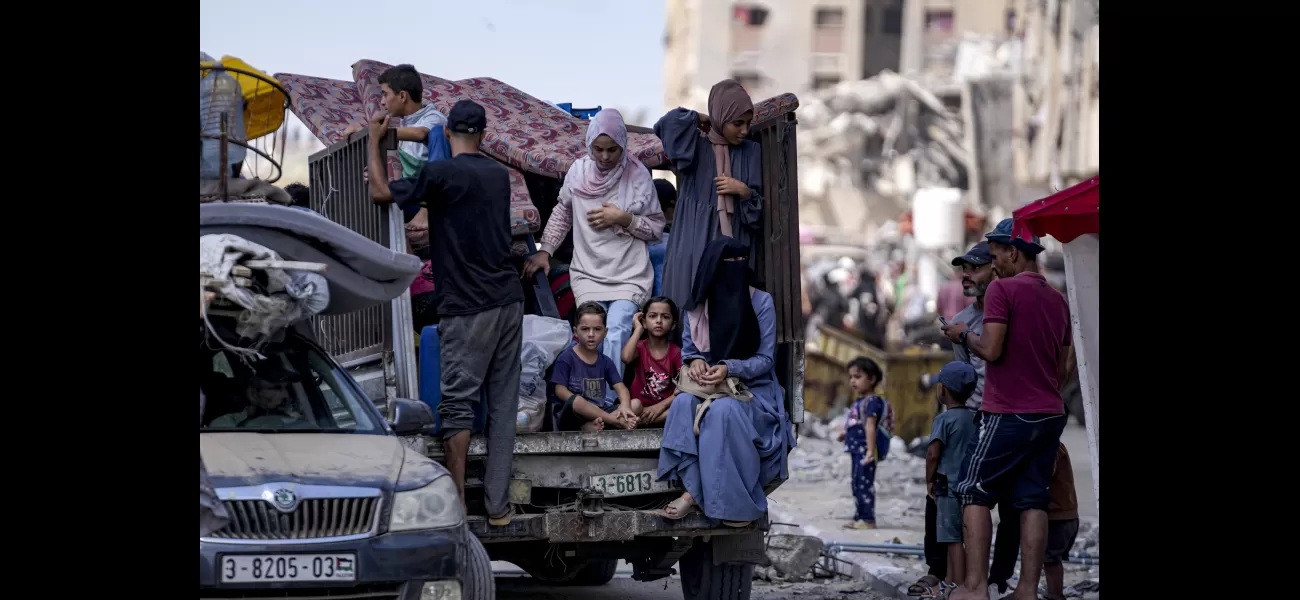Israel's push for a divided Gaza could harm peace negotiations, causing concerns for a potential cease-fire agreement.
Final opportunity to prevent an Iranian attack on Israel as tensions escalate in the Middle East.
August 15th 2024.

International mediators have been working tirelessly to find a solution to the ongoing conflict between Israel and Hamas. The latest round of talks, which took place overnight, focused on two main goals: halting the war and securing the release of the many hostages held by both sides.
Representatives from the US, Qatar, and Egypt met with Israeli delegates in Qatar, while the death toll in Gaza continued to rise. According to health authorities, over 40,000 Palestinians have lost their lives in the 10-month-long war.
However, Hamas, the militant group in control of Gaza, did not participate directly in the talks. They have accused Israel of adding new demands to a previous proposal that had the support of the US and the international community. This proposal had also been accepted by Hamas in principle.
White House National Security spokesperson John Kirby has called these talks a crucial step, and they are expected to continue into the next day. He acknowledged that a lot of work still needs to be done, given the complexity of reaching an agreement, and that negotiators are currently focused on the implementation of any potential deal.
A ceasefire in Gaza would not only bring an end to the immediate conflict, but it could also help ease tensions in the entire region. Diplomats hope that it would prevent Iran and Lebanon's militant group Hezbollah from retaliating for the deaths of a top Hezbollah commander and Hamas' political leader.
However, Kirby has also warned that Iran may launch an attack without warning, and their threats should be taken seriously. The mediators have been working for months to come up with a three-phase plan that would see Hamas releasing the hostages they captured in October, in exchange for a lasting ceasefire, the withdrawal of Israeli forces from Gaza, and the release of Palestinian prisoners held by Israel.
US President Joe Biden announced this plan on May 31, and both sides have agreed to it in principle. However, there are still gaps that need to be addressed, and negotiations have been ongoing for months. Hamas has rejected Israel's latest demands, which include a lasting military presence along the Gaza-Egypt border and a line dividing Gaza where they would search returning Palestinians for weapons.
Hamas spokesperson Osama Hamdan has made it clear that they are only interested in discussing the implementation of Biden's proposal and not in further negotiations over its content. However, a Palestinian official close to the talks has revealed that Hamas' senior officials in Qatar are ready to discuss any proposals put forward by the mediators.
Israeli Prime Minister Benjamin Netanyahu has denied that Israel has made any new demands, but he has also stated that they remain committed to achieving "total victory" against Hamas and the release of all the hostages. The main point of contention is the transition from the first phase of the ceasefire to the second. Hamas is worried that Israel will resume the war after releasing the first batch of hostages, while Israel fears that Hamas will drag out negotiations for the remaining hostages indefinitely.
Despite these challenges, Hamas had previously agreed to a US proposal, which stated that talks on the transition would begin on the 16th day of the first phase and conclude by the fifth week. However, they have since objected to what they claim are new demands from Israel, such as maintaining a presence along the Gaza-Egypt border and a road dividing northern and southern Gaza.
Israel has denied that these are new demands, stating that they need to prevent weapons smuggling and search returning Palestinians for weapons. The demands were only made public recently, and Hamas has responded by demanding a full Israeli military withdrawal, which was included in all previous versions of the ceasefire proposal.
US State Department spokesperson Vedant Patel has stated that the broader framework of Biden's proposal has been accepted by both sides and that negotiations will continue. Meanwhile, you can stay up-to-date on all the latest breaking news, celebrity updates, and sports news by following our WhatsApp channel. Join us now for a private and ad-free experience.
Representatives from the US, Qatar, and Egypt met with Israeli delegates in Qatar, while the death toll in Gaza continued to rise. According to health authorities, over 40,000 Palestinians have lost their lives in the 10-month-long war.
However, Hamas, the militant group in control of Gaza, did not participate directly in the talks. They have accused Israel of adding new demands to a previous proposal that had the support of the US and the international community. This proposal had also been accepted by Hamas in principle.
White House National Security spokesperson John Kirby has called these talks a crucial step, and they are expected to continue into the next day. He acknowledged that a lot of work still needs to be done, given the complexity of reaching an agreement, and that negotiators are currently focused on the implementation of any potential deal.
A ceasefire in Gaza would not only bring an end to the immediate conflict, but it could also help ease tensions in the entire region. Diplomats hope that it would prevent Iran and Lebanon's militant group Hezbollah from retaliating for the deaths of a top Hezbollah commander and Hamas' political leader.
However, Kirby has also warned that Iran may launch an attack without warning, and their threats should be taken seriously. The mediators have been working for months to come up with a three-phase plan that would see Hamas releasing the hostages they captured in October, in exchange for a lasting ceasefire, the withdrawal of Israeli forces from Gaza, and the release of Palestinian prisoners held by Israel.
US President Joe Biden announced this plan on May 31, and both sides have agreed to it in principle. However, there are still gaps that need to be addressed, and negotiations have been ongoing for months. Hamas has rejected Israel's latest demands, which include a lasting military presence along the Gaza-Egypt border and a line dividing Gaza where they would search returning Palestinians for weapons.
Hamas spokesperson Osama Hamdan has made it clear that they are only interested in discussing the implementation of Biden's proposal and not in further negotiations over its content. However, a Palestinian official close to the talks has revealed that Hamas' senior officials in Qatar are ready to discuss any proposals put forward by the mediators.
Israeli Prime Minister Benjamin Netanyahu has denied that Israel has made any new demands, but he has also stated that they remain committed to achieving "total victory" against Hamas and the release of all the hostages. The main point of contention is the transition from the first phase of the ceasefire to the second. Hamas is worried that Israel will resume the war after releasing the first batch of hostages, while Israel fears that Hamas will drag out negotiations for the remaining hostages indefinitely.
Despite these challenges, Hamas had previously agreed to a US proposal, which stated that talks on the transition would begin on the 16th day of the first phase and conclude by the fifth week. However, they have since objected to what they claim are new demands from Israel, such as maintaining a presence along the Gaza-Egypt border and a road dividing northern and southern Gaza.
Israel has denied that these are new demands, stating that they need to prevent weapons smuggling and search returning Palestinians for weapons. The demands were only made public recently, and Hamas has responded by demanding a full Israeli military withdrawal, which was included in all previous versions of the ceasefire proposal.
US State Department spokesperson Vedant Patel has stated that the broader framework of Biden's proposal has been accepted by both sides and that negotiations will continue. Meanwhile, you can stay up-to-date on all the latest breaking news, celebrity updates, and sports news by following our WhatsApp channel. Join us now for a private and ad-free experience.
[This article has been trending online recently and has been generated with AI. Your feed is customized.]
[Generative AI is experimental.]
0
0
Submit Comment





